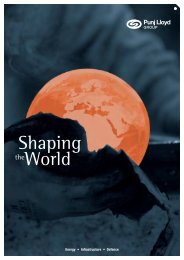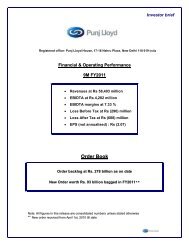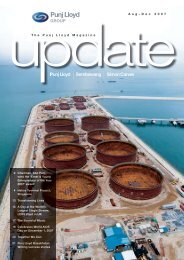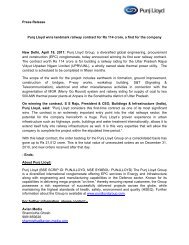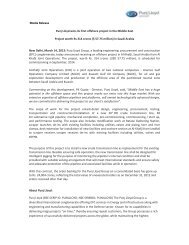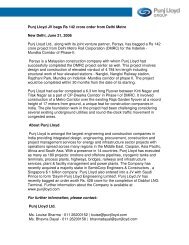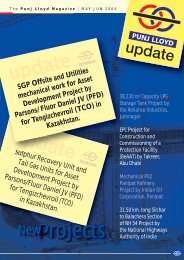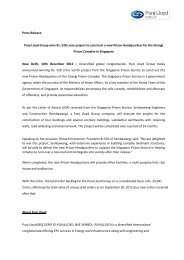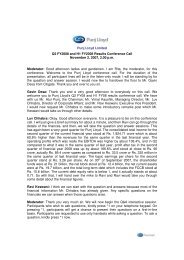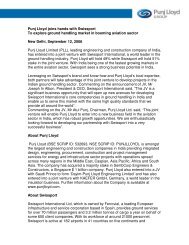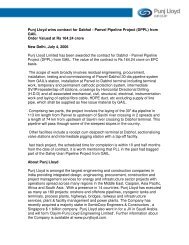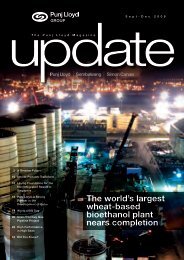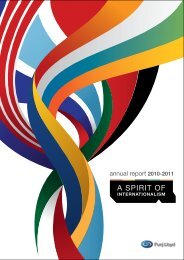âTCS Second Quarter Earnings Conference Callâ - Punj Lloyd Group
âTCS Second Quarter Earnings Conference Callâ - Punj Lloyd Group
âTCS Second Quarter Earnings Conference Callâ - Punj Lloyd Group
Create successful ePaper yourself
Turn your PDF publications into a flip-book with our unique Google optimized e-Paper software.
Rajesh Agarwal<br />
Luv Chhabra<br />
Rajesh Agarwal<br />
So we are again gaining ground on our main forte which is oil & gas and<br />
pipelines so infrastructure will gradually reduce and those things will increase<br />
so our margins will directionally move up from 8% to 9% which we have<br />
experienced in the last one or two years?<br />
I'm not saying that infrastructure is not our forte. Let me correct that<br />
impression, we have companies that do only infrastructure work; Sembawang<br />
is an excellent example of a company that has for the last two years delivered<br />
consistently robust returns in the infrastructure sector. We are just talking of<br />
the proportion of our infrastructure business business vis-à-vis the oil and gas.<br />
As a proportion if it comes down will be a directionally positive to our overall<br />
margins. Can we have any kind of assumptions for tax expense, we work<br />
across different geographies so where we make profit and loss somewhere<br />
else but tax expenditure is very huge so if I could make any assumptions or<br />
estimation on what would be the tax expenditure for the full year, how would I<br />
do that and on what basis?<br />
Atul <strong>Punj</strong> I think it is very difficult to predict because we are working across 21<br />
geographies, every region has different taxation rates. With different<br />
revenues and profitability in each region how it will affect tax rate is difficult to<br />
predict.<br />
Moderator<br />
Prashant Jain<br />
Atul <strong>Punj</strong><br />
Prashant Jain<br />
Our next question is from Prashant Jain from HDFC Fund<br />
Mr. <strong>Punj</strong> can you elaborate on the capital expenditure last year In a time,<br />
when our balance sheet is already under so much of stresstypically we see<br />
contracting companies take equipments on hire so what has been the strategy<br />
here because the CAPEX seems to be disproportionately large to an outsider<br />
given the uncertain environment and the stretched balance sheet.What is the<br />
capital expenditure program for the current year and also if you'd like to<br />
comment the capital expenditures finally what the balance sheet shows is, in<br />
my opinion higher than what was probably guided on our expectations during<br />
the course of last year?<br />
We have always maintained our CAPEX is linked directly with project<br />
requirements. Now when we picked this large project in Myanmar, there is no<br />
rental operation in Myanmar. If we look at the rental rates that we are able to<br />
get there, we can pay for the new equipment in about the nine months rental<br />
period.. We base our decisions on acquisitions simply on each project<br />
requirement. When you talked about disproportionate, there are different<br />
verticals in the company that have different needs of equipments. Pipelines for<br />
example are much more equipment intensive than the civil job, particularly a<br />
building job where we have a couple of tower cranes, we will have a couple of<br />
batching plants, we will have a couple of excavators and that's about it.<br />
Pipelines generally are much more equipment intensive and that's what is<br />
affecting our capex. We don't really plan any annual CAPEX; our CAPEX is<br />
directly linked with project wins. The philosophy as a company is that at the<br />
end of a project, if there is no need for the equipment, we will sell that<br />
equipment. That policy that has been put in to effect now and you will see that<br />
this number of the CAPEX or the equipment number will go up and down<br />
based on the project needs that we have in the company rather than<br />
equipment sitting idle, waiting for an imminent project.<br />
But in the current environment would it be a very prudent strategy where<br />
balance sheet is already stretched and we need to generate some free cash<br />
flows, this way you will keep on buying equipments for one project and then<br />
Page 8 of 12



